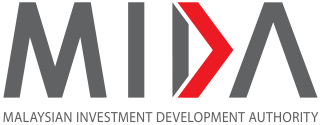
The economy of the Czech Republic is a developed export-oriented social market economy based in services, manufacturing, and innovation that maintains a high-income welfare state and the European social model. The Czech Republic participates in the European Single Market as a member of the European Union, and is therefore a part of the economy of the European Union. It uses its own currency, the Czech koruna, instead of the euro. It is a member of the Organisation for Economic Co-operation and Development (OECD). The Czech Republic ranks 16th in inequality-adjusted human development and 24th in World Bank Human Capital Index, ahead of countries such as the United States, the United Kingdom or France. It was described by The Guardian as "one of Europe's most flourishing economies".

The Overseas Private Investment Corporation (OPIC) was the United States Government's Development finance institution until it merged with the Development Credit Authority (DCA) of the United States Agency for International Development (USAID) to form the U.S. International Development Finance Corporation (DFC). OPIC mobilized private capital to help solve critical development challenges and in doing so, advanced the foreign policy of the United States and national security objectives.

Venture capital (VC) is a form of private equity financing provided by firms or funds to startup, early-stage, and emerging companies, that have been deemed to have high growth potential or that have demonstrated high growth in terms of number of employees, annual revenue, scale of operations, etc. Venture capital firms or funds invest in these early-stage companies in exchange for equity, or an ownership stake. Venture capitalists take on the risk of financing start-ups in the hopes that some of the companies they support will become successful. Because startups face high uncertainty, VC investments have high rates of failure. Start-ups are usually based on an innovative technology or business model and they are often from high technology industries, such as information technology (IT), clean technology or biotechnology.

A foreign direct investment (FDI) refers to purchase of an asset in another country, such that it gives direct control to the purchaser over the asset. In other words, it is an investment in the form of a controlling ownership in a business, in real estate or in productive assets such as factories in one country by an entity based in another country. It is thus distinguished from a foreign portfolio investment or foreign indirect investment by a notion of direct control.

The Regional Policy of the European Union (EU), also referred as Cohesion Policy, is a policy with the stated aim of improving the economic well-being of regions in the European Union and also to avoid regional disparities. More than one third of the EU's budget is devoted to this policy, which aims to remove economic, social and territorial disparities across the EU, restructure declining industrial areas and diversify rural areas which have declining agriculture. In doing so, EU regional policy is geared towards making regions more competitive, fostering economic growth and creating new jobs. The policy also has a role to play in wider challenges for the future, including climate change, energy supply and globalisation.

An export credit agency or investment insurance agency is a private or quasi-governmental institution that acts as an intermediary between national governments and exporters to issue export insurance solutions and guarantees for financing. The financing can take the form of credits or credit insurance and guarantees or both, depending on the mandate the ECA has been given by its government. ECAs can also offer credit or cover on their own account. This does not differ from normal banking activities. Some agencies are government-sponsored, others private, and others a combination of the two.

The Malaysian Investment Development Authority, abbreviated MIDA, previously known as Malaysian Industrial Development Authority is the government's principal agency to oversee and drive investment into the manufacturing and services sectors in Malaysia. Starting operations in 1967, MIDA was given the mandate to promote investments in the manufacturing and services sectors; and to advise the Ministry of International Trade and Industry (MITI) on industry matters including the formulation of related policies.

Foreign direct investment in Iran (FDI) has been hindered by unfavorable or complex operating requirements and by international sanctions, although in the early 2000s the Iranian government liberalized investment regulations. Iran ranks 62nd in the World Economic Forum's 2011 analysis of the global competitiveness of 142 countries. In 2010, Iran ranked sixth globally in attracting foreign investments.

SARIO, Slovak Investment and Trade Development Agency is a government agency established in the Slovak Republic in 2001, which works under the direction of the Ministry of Economy of the Slovak Republic.
In 2012, Romania's largest trading partner was Germany, followed by Italy. Romania's main exports to Germany were insulated wire, cars and vehicle parts, whereas its main German imports are cars and vehicle parts. The principal Italian imports to Romania include hides, footwear parts, medicaments, telephones and vehicle parts. Romania's chief exports to Italy included leather footwear, cars, telephones, tobacco, men's suits, seats and iron pipes.
Between 1950 and 1960, the imperial government of Ethiopia enacted legislation and implemented a new policy to encourage foreign investment in the Ethiopian economy. This new policy provided investor benefits in the form of tax exemptions, remittances of foreign exchange, import and export duty relief, tax exemptions on dividends, and the provision of financing through the Ethiopian Investment Corporation and the Development Bank of Ethiopia. In addition, the government guaranteed protection to industrial enterprises by instituting high tariffs and by banning the importation of commodities that might adversely affect production of domestic goods. Protected items included sugar, textiles, furniture, and metal. The government also participated through direct investment in enterprises that had high capital costs, such as oil refineries and the paper and pulp, glass and bottle, tire, and cement industries. In 1963, with the Second Five-Year Plan under way, the government enacted Proclamation No. 51. The proclamation's objective was to consolidate other investment policies enacted up to that period, to extend benefits to Ethiopian investors, and to create an Investment Committee that would oversee investment programs. In 1966 the Ethiopian government enacted Proclamation No. 242, which elevated the Investment Committee's status as an advisory council to that of an authorized body empowered to make independent investment decisions. Thus, by the early 1970s, Ethiopia's industrialization policy included a range of fiscal incentives, direct government investment, and equity participation in private enterprises.
A non-banking financial institution (NBFI) or non-bank financial company (NBFC) is a financial institution that is not legally a bank; it does not have a full banking license or is not supervised by a national or international banking regulatory agency. NBFC facilitate bank-related financial services, such as investment, risk pooling, contractual savings, and market brokering. Examples of these include hedge funds, insurance firms, pawn shops, cashier's check issuers, check cashing locations, payday lending, currency exchanges, and microloan organizations. Alan Greenspan has identified the role of NBFIs in strengthening an economy, as they provide "multiple alternatives to transform an economy's savings into capital investment which act as backup facilities should the primary form of intermediation fail."

The Zamboanga City Special Economic Zone (or ZamboEcoZone), otherwise known by its corporate name as Zamboanga Freeport Authority (ZFA), is a special economic zone located in Zamboanga City in the province of Zamboanga del Sur in Mindanao, Philippines. It is the only economic zone located in Western Mindanao.

Invest KOREA (IK), Korea's national investment promotion agency, was established as part of the Korea Trade-Investment Promotion Agency (KOTRA) to promote foreign direct investment (FDI) to Korea. It provides comprehensive services for all investment stages of Korea, including investment feasibility study, investment execution, and grievance resolution.

Invest Lithuania is the national investment promotion agency responsible for the attraction and retention of foreign direct investment (FDI) in Lithuania. The agency provides free-of-charge services to companies interested in launching or expanding their operations in Lithuania.

Land grabbing is the large-scale acquisition of land through buying or leasing of large pieces of land by domestic and transnational companies, governments, and individuals.
The Vanuatu Foreign Investment Promotion Agency (VFIPA), is Vanuatu's National investment promotion agency. It was established by the foreign investment act [cap 248] in 1998 and operating as a unit under the department of Trades and Industry with a mandate to "promote and facilitate foreign investments into Vanuatu."
Investment incentive is a government-implemented incentive policy aimed to encourage investors into its domestic market or to promote expansion of existing businesses. Investment incentives encompass creating an environment that enables foreign businesses to operate profitably and decreases risks. They are widely used by developing countries to attract investments. The incentives take form of "direct subsidies or corporate income tax credits that compensates the investors for their capital costs".

The Costa Rican Foreign Trade Promoter (PROCOMER) is a Costa Rican investment promotion agency responsible for export promotion programs, attracting foreign direct investment, and providing technical and financial support for the administration of Costa Rica's special export regimes.















